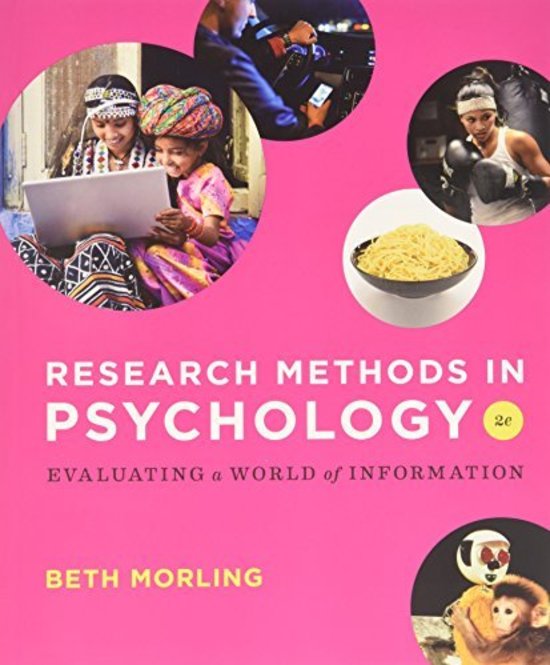Introduction to Research Methods
Part I: Introduction to Scientific Reasoning
Chapter 1: Psychology Is a Way of Thinking
LEARNING OBJECTIVES:
Explain what it means to reason empirically.
Appreciate how an understanding of psychological research methods is crucial not
only for producers of information but also for consumers of information.
Describe five processes that shape psychological science.
Research Producers, Research Consumers
Research Producers: students fascinated by the research process and aim to become
producers of research information.
E.g. research scientists, professors.
Research Consumers: students wanting to become consumers of research
information, reading research so they can later apply it to their work, hobbies,
relationships, personal growth.
E.g. therapists, counselors, teachers, entrepreneurs.
In practice, many psychologists engage in both roles:
When planning their research and creating new knowledge, they study the work of
others who have gone before them.
Psychologists in both roles require a curiosity about behavior, emotion, and
cognition.
Research producers and consumers share a desire to ask, answer, and communicate
interesting questions and share a commitment to practice empiricism.
Why the Producer Role Is Important
Some students need skills as producers of research they develop research method skills to
work in research labs and discover new knowledge. E.g. knowing how to randomly assign
people to groups, how to measure attitudes accurately, how to interpret results from a graph
etc.
,Why the Consumer Role Is Important
Some students need skills as consumers of research need to be able to find, read, and
evaluate the research behind important policies, therapies, workplace decisions. Need to
know how to critically interrogate information, ask the right questions, determine the
answers, and evaluate a study on the basis of those answers.
The Benefits of Being a Good Consumer
Having good consumer research skills means being able to evaluate the evidence behind the
claims of a salesperson, journalist, or researcher, and making better, more informed
decisions by asking the right questions.
CHECK YOUR UNDERSTANDING:
Explain what the consumer of research and producers of research roles have in
common, and describe how they differ.
What kinds of jobs would use consumer-of-research skills? What kinds of jobs would
use producers-of-research skills?
How Scientists Approach Their Work
Psychological scientists are defined by what they do.
Scientists act as empiricists in their investigations.
Test theories through research and adapt their theories based on the resulting data.
Scientists take an empirical approach to both applied research and basic research.
Psychologists make their work public sharing findings of psychological research
with the popular media.
Scientists Are Empiricists
As scientists, psychologists are empiricists and base their conclusions on systematic,
unbiased observations of the world.
Empiricism: involves using evidence from the senses or from instruments that assist
the senses as the basis for conclusions.
Empiricists aim to make their work independently verifiable by other observers or scientists.
Scientists Test Theories: The Theory-Data Cycle
, In the theory-data cycle, a scientist takes systematic steps to solve a problem. Researchers
propose theories, make hypotheses, and collect data. They collect data to test, change, or
update their theories.
The Cupboard Theory vs the Contact Comfort Theory
Cupboard Theory: a mother is valuable to a baby mammal because she is a source of
food.
Comfort Theory: babies are attached to their mothers because of the comfort of cozy
touch.
Harlow’s Monkey experiment: Harlow used two theories to make two specific predictions
and then used the data to support one theory.
Theory, Hypothesis, and Data
Theory: a set of statements that
describes general principles about how
variables relate to one another.
Hypothesis: /prediction, a way of stating
the specific outcome the researcher
expects to observe if the theory is
accurate.
Data: a set of observations, which will
either support or challenge the theory
and hypotheses. Data matching the
hypotheses will strengthen confidence in
the theory, data that does not indicates
that the theory must be revised.
Features of Good Scientific Theories
Good theories are supported by data.
Good theories are falsifiable. A theory must lead to a hypothesis that could actually
fail to support the theory.
- Data is only useful if they can convince us that the theory is either correct or
incorrect.






